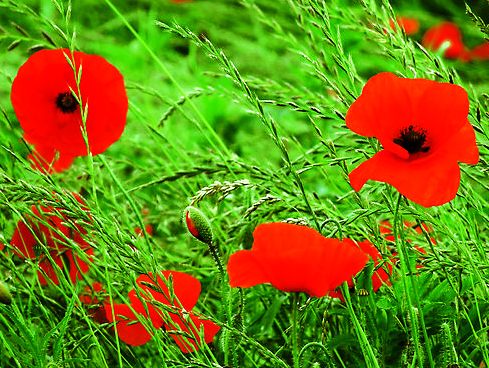 |
| In Flanders Field, the poppies blow... |
The poppy became a symbol of World War I dead and Armistice Day because of In Flanders Fields, the great poem by the Canadian John McCrae who was a battlefield physician in Belgium in 1915.
The day was originally called Armistice Day, because it marked the ending of hostilities in Europe, on November 11, 1918.
In the British Commonwealth, the day became known as Remembrance Day. In the United States, it is the day set aside for honoring of veterans.
Our honoring of Veterans Day in November suffers by comparison with Memorial Day, which has a similar purpose and is more widely observed as a holiday because it starts the U.S. summer season. Memorial Day also dates back further, to 1866 when a memorial was first held in Waterloo, NY to honor dead Union soldiers.
Our honoring of November 11 as the end of the "Great War" is also not as poignant as it is in Europe, where an entire generation of young men was cut down by machine guns in the tragedy of World War I trench warfare started by an assassination and then moving ahead inexorably as treaty after treaty came into effect and no one was able to halt the death march.
The memory of so many young men having been killed senselessly is evoked by The Green Fields of France, a poignant song about the fallen soldier Willy McBride. Some 250,000 Americans died in Europe in World War I, but as was the case in World War II the impact on the United States was much less devastating than on Europe, where losses were much greater over a longer period, out of smaller populations. My friend Tim Sullivan sent me the inspiring story of Alan Seeger, a Yank who volunteered to join the French and British forces after the Kaiser invaded Belgium and France in 1914. But Seeger was a rarity. The United States didn't join in the war until 1917 and it was soon over.
Ironically, America's longest war, although not the deadliest, is the one that we are still in, what is called the Gulf War, parts I and II, with Part II beginning on September 11, 2001. The longest war in our history, but the smallest percentage of our population is involved in fighting the war.
So - let us pay proper tribute to the day by saluting all those who have fought for their country - and the families of those who have had to cope with their warrior not returning, or returning with injuries - and all other innocent victims of wars.
No comments:
Post a Comment